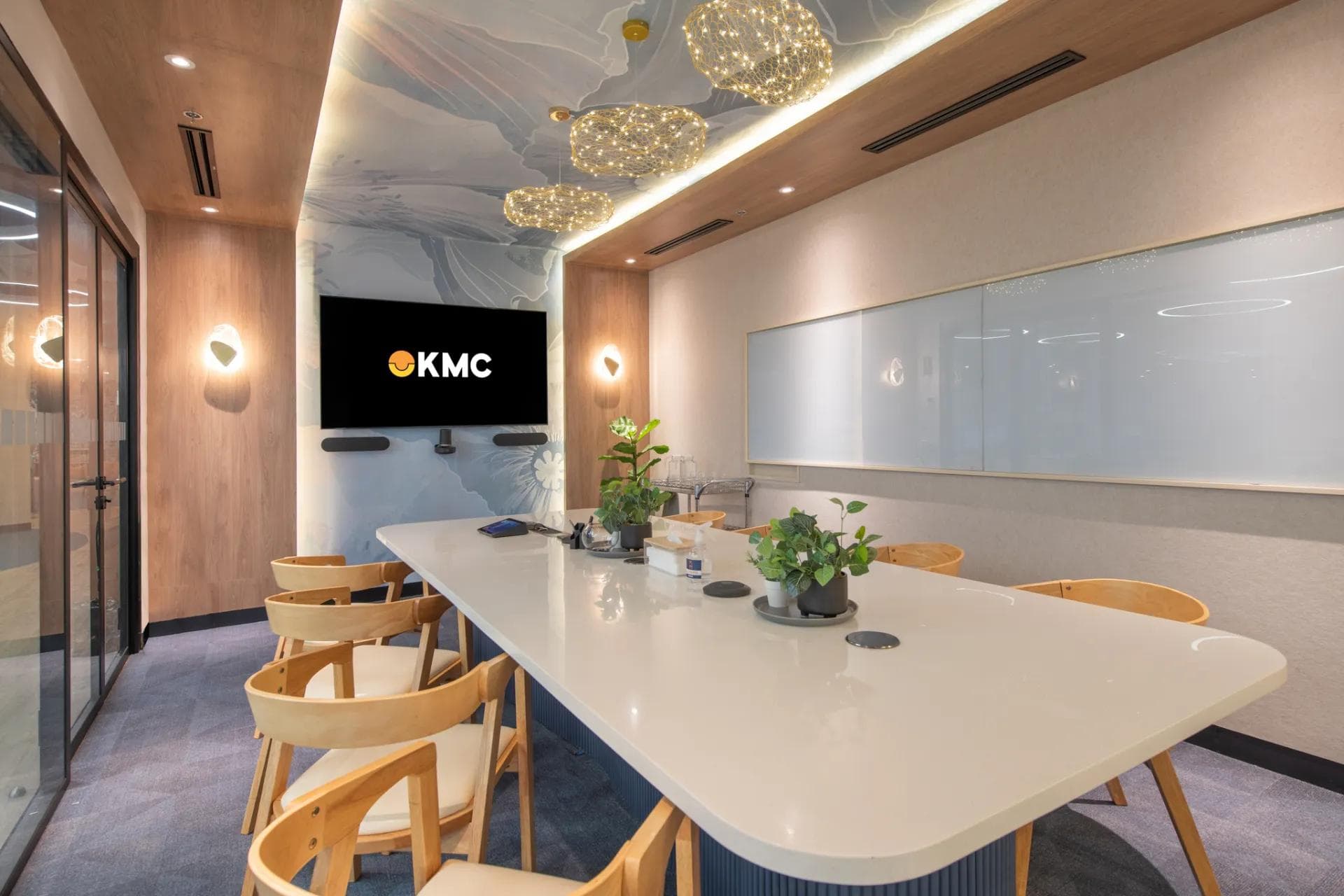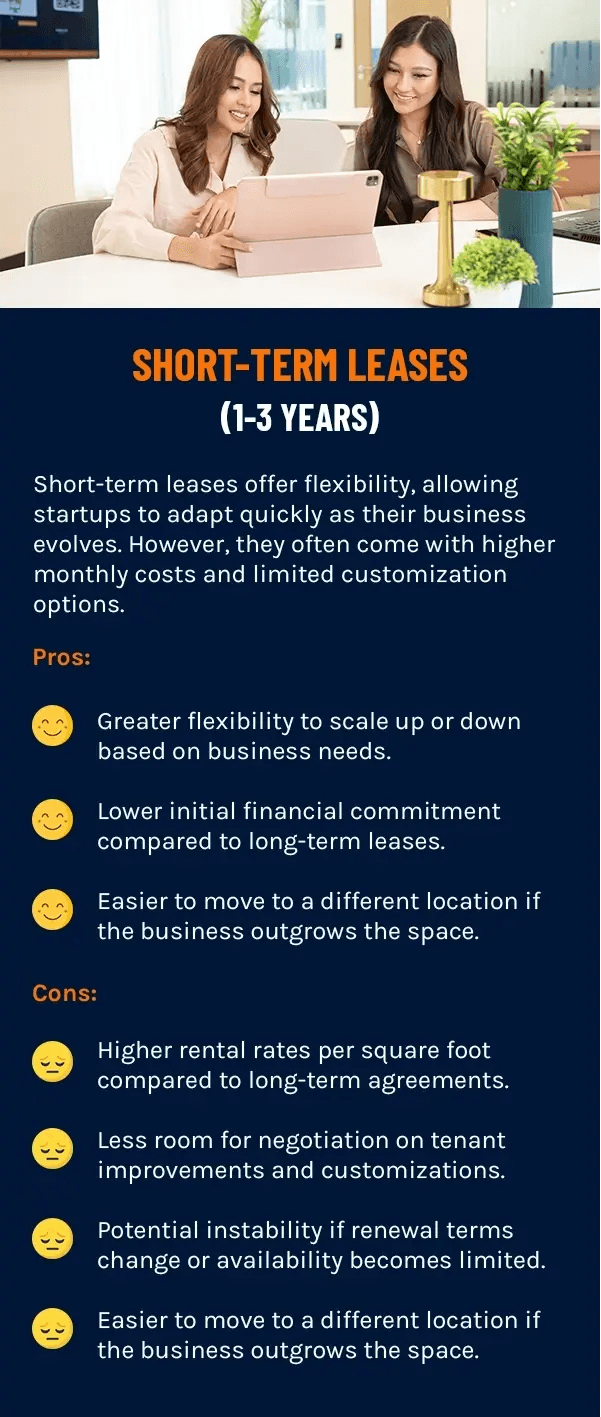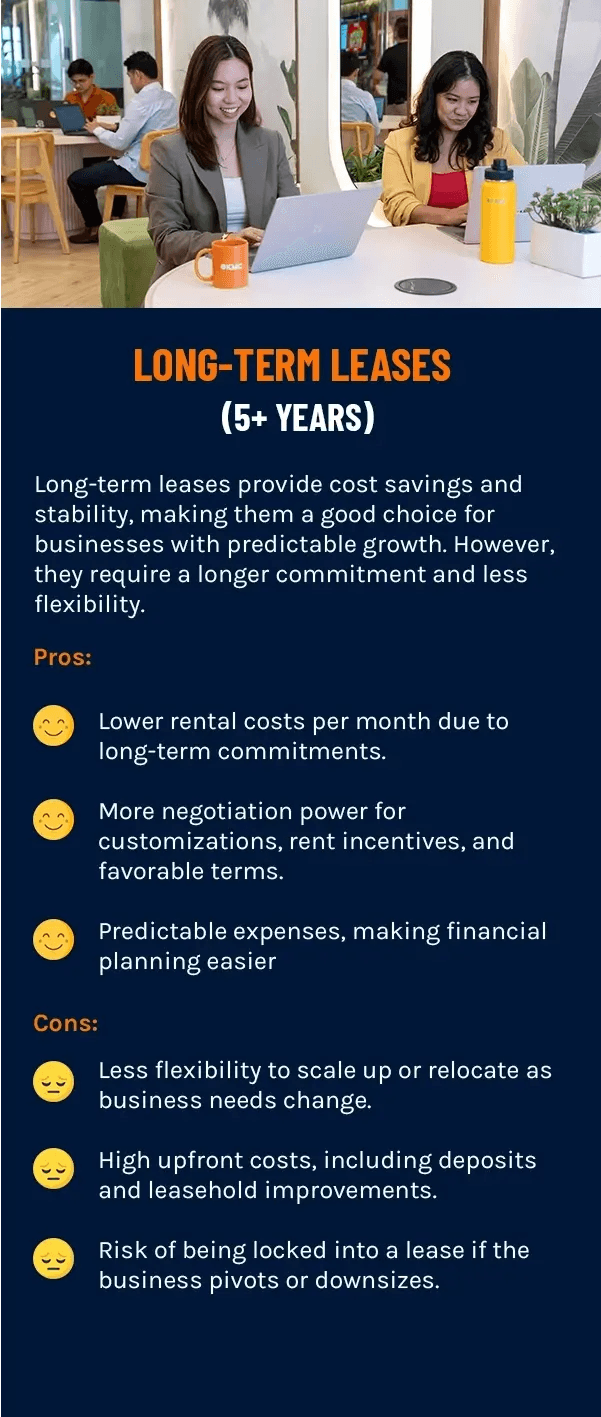
For many startups, the idea of leasing office space might seem like an unnecessary expense. With remote work on the rise and coworking spaces offering flexible alternatives, why commit to a lease? However, leasing an office space can provide a strategic advantage that accelerates growth, enhances credibility, and fosters team collaboration. Additionally, it gives you access to premium office locations without the financial burden of purchasing property. In this guide, we’ll explore the key reasons why leasing an office space is a smart move, covering cost considerations, lease structures, and how to choose the best workspace for your business.
Why Lease an Office Space? 5 Key Benefits You Should Know
You don’t need to buy a building to build a business. Leasing gives startups and growing teams room to move—literally and financially. It’s flexible, strategic, and puts you right where the action is.
Here’s what makes it a smart move:
- Lower Initial Investment – Leasing requires no major down payments, allowing startups to allocate more capital to product development, marketing, and business growth rather than property purchases. Monthly expenses remain predictable, making financial planning easier.
- Greater Flexibility and Scalability – Short-term and flexible lease options enable startups to scale up or down as needed, ensuring they only pay for the space they require. This adaptability is crucial for businesses in their early stages of growth.
- Prime Location Benefits – Leasing provides access to high-value business hubs without the excessive costs of property ownership. A central location enhances visibility, networking opportunities, and access to clients and partners.
- Boosted Professional Image – A physical office space enhances credibility, increases client confidence, and strengthens branding opportunities. A professional business address signals stability and commitment to long-term success.
- Hassle-Free Operations & Access to Premium Facilities – Many leases include maintenance, utilities, security services, and access to high-speed internet, meeting rooms, and shared spaces—eliminating the hassle of setting up an office from scratch.
Looking for a flexible lease that fits your business needs? Browse available office spaces in Philippines now!
Understanding Office Lease Expenses
Before diving into the numbers, it's important to know what you're actually paying for. Office leases come with more than just rent—there are other hidden and variable costs that can impact your budget if overlooked.
What Are the Common Costs in an Office Lease?
When leasing an office, you’ll encounter different costs beyond just base rent. Here’s a breakdown of what to expect:
- Base Rent: The fixed monthly fee for the space, usually calculated per square meter or foot.
- Utilities: Costs for electricity, water, internet, and telecommunication services. These may be included in the lease or charged separately.
- Maintenance Fees: Covers cleaning, security, and general upkeep of common areas like lobbies, elevators, and restrooms.
- Fit-Out Costs: If the office is semi-fitted, you may need to budget for office furniture, partitions, and other renovations. Fully fitted spaces come with ready-to-use facilities but may have a higher rental rate.
How to Choose an Office Space That Grows with Your Startup
The right office space isn’t just about today—it’s about where your startup is heading. From lease terms to location, every choice should support flexibility, team dynamics, and long-term momentum. Here’s how to make sure your next space moves with you, not against you:
Opt for Short-Term or Flexible Leases
Startups need agility. Locking into a long-term lease before understanding your business’s growth trajectory can be risky. Instead, seek out flexible lease options that allow you to scale up—or down—depending on your needs.
Choose a Location That Supports Business Growth
Your office’s location isn’t just about convenience; it’s about opportunity. Leasing in a business hub places you closer to potential clients, investors, and top-tier talent. Also, consider accessibility—your team and clients should be able to reach your office easily via major transport routes.
Here are some of the top business hubs in the Philippines:
- Makati CBD – The country’s financial and business epicenter, home to major banks, multinational companies, and top corporate headquarters.
- Bonifacio Global City (BGC) – A thriving hub for startups, tech firms, and multinational corporations, known for its modern infrastructure and vibrant business environment.
- Ortigas Center – A prime location for corporate offices and BPO companies, with easy access to key transport links.
- Cebu IT Park – The leading business hub in Visayas, ideal for tech startups and outsourcing firms looking for top-tier talent.
- Clark Freeport Zone – An emerging business district with tax incentives, a growing IT-BPM sector, and proximity to international logistics routes.
- Iloilo Business Park – A rising economic hub outside Metro Manila, attracting BPOs and multinational companies due to its competitive costs and skilled workforce.
Look for a Space That Matches Your Team's Needs
The way your team works should dictate the type of office you choose. Long communal tables in shared office spaces can foster collaboration, while private offices may be necessary for client-facing businesses. If you’re embracing a hybrid work model, consider an office setup that accommodates both in-office and remote work seamlessly.
Prioritize Office Amenities That Improve Efficiency
A well-equipped office can significantly impact productivity. Look for spaces that offer high-speed internet, dedicated meeting rooms, and ergonomic workstations. Wellness areas and thoughtfully designed environments—such as those incorporating biophilic elements—can also enhance creativity and well-being. Shared office hubs and coworking spaces often provide these essentials without the added operational costs.
Which Office Class Is Right for Your Startup's Stage and Strategy?
Not all office spaces are created equal—and that’s a good thing. Whether you're building investor confidence or bootstrapping your way to product-market fit, understanding the difference between Class A, B, and C offices can help you make a smarter, more aligned choice for your team and your bottom line.
Class A Office Spaces
These are premium office buildings located in prime business districts. They offer top-tier amenities such as high-speed elevators, modern infrastructure, and advanced security systems. Class A offices are ideal for established companies and startups looking to impress investors, attract top talent, and provide employees with a world-class work environment. With modern design, prime locations, and superior facilities, these spaces come at a premium cost but offer a prestigious address and an enhanced business image.
Class B/C Office Spaces
Class B and C office spaces are more cost-effective alternatives while still providing functional work environments. While they may not have the high-end amenities of Class A buildings, they offer advantages such as lower rental costs, strategic yet more affordable locations, and greater flexibility in space customization. Class B offices are typically well-maintained with fewer luxury finishes, making them a solid choice for growing businesses. Class C spaces, on the other hand, are the most budget-friendly, often found in older buildings with basic facilities. For startups managing tight budgets, these offices can serve as a practical stepping stone, allowing businesses to allocate more resources toward growth while still securing a professional workspace.
What Hidden Costs Should Startups Watch Out For?
Leasing might look straightforward on paper—but some costs tend to hide in the fine print. These unexpected charges can chip away at your budget if you’re not prepared. Here are a few to keep on your radar before signing that lease.
- Service Charges: Some landlords impose additional fees for building maintenance and services.
- Exit Fees: Breaking a lease early may result in penalties, which can be significant.
- Insurance Requirements: Landlords may require tenants to have liability insurance, which adds to operating costs.
- Property Taxes and Fees: Some agreements may include property tax responsibilities for tenants.
What Are Your Responsibilities in an Office Lease—And What Falls on the Landlord?
Before signing the dotted line, it’s crucial to understand what you're signing up for. Lease agreements often outline shared responsibilities—some fall on you, others on your landlord. From maintenance and repairs to design modifications and legal compliance, knowing who handles what can help you avoid unexpected costs, delays, or legal issues down the line.
Maintenance & Repairs
- Landlord Responsibilities: Structural maintenance, HVAC system repairs, and common area management.
- Tenant Responsibilities: Office cleaning, minor repairs, and interior upkeep.
Legal Considerations Before Signing a Lease
- Modification Permissions: Guidelines on interior changes, branding, and office design adjustments.
- Compliance Requirements: Safety standards, fire exits, and accessibility regulations.
How Long Should Your Startup Commit to an Office Lease?
Lease duration can directly impact your startup’s agility and financial planning. Whether you’re just getting started or planning your next growth phase, choosing the right lease term—short or long—can make all the difference. Let’s break down what each option offers.
1. Short-Term Leases (1-3 Years)
Short-term leases offer flexibility, allowing startups to adapt quickly as their business evolves. However, they often come with higher monthly costs and limited customization options.
a. Pros:
- Greater flexibility to scale up or down based on business needs.
- Lower initial financial commitment compared to long-term leases.
- Easier to move to a different location if the business outgrows the space.
b. Cons:
- Higher rental rates per square foot compared to long-term agreements.
- Less room for negotiation on tenant improvements and customizations.
- Potential instability if renewal terms change or availability becomes limited.

2. Long-Term Leases (5+ Years)
Long-term leases provide cost savings and stability, making them a good choice for businesses with predictable growth. However, they require a longer commitment and less flexibility.
a. Pros:
- Lower rental costs per month due to long-term commitments.
- More negotiation power for customizations, rent incentives, and favorable terms.
- Predictable expenses, making financial planning easier.
b. Cons:
- Less flexibility to scale up or relocate as business needs change.
- High upfront costs, including deposits and leasehold improvements.
- Risk of being locked into a lease if the business pivots or downsizes.

What Are Your Options Beyond Traditional Office Leases?
If you're unsure whether to commit to a short-term or long-term lease, there are alternative workspace solutions that offer flexibility without the constraints of a traditional lease. These options provide startups with adaptable, cost-effective solutions that can evolve alongside their business needs.
- Flexible Office Spaces: Fully serviced offices with short-term contracts and all-inclusive amenities.
- Coworking Spaces: Shared office environments offer affordable, flexible memberships with access to high-speed internet, meeting rooms, and collaborative work areas. These spaces encourage networking, foster innovation, and are ideal for early-stage companies looking to grow alongside like-minded professionals.
- Hybrid Workspaces: A mix of remote and physical offices to accommodate modern workforce trends.
Proworking with KMC: A Premium Shared Workspace Experience
“Proworking” is KMC Solutions’ exclusive take on coworking—designed for teams who want more than just a desk. While it offers the same flexibility and community benefits of traditional shared spaces, KMC’s proworking delivers a more refined, professional experience.
Startups and scaling businesses enjoy upscale amenities, enterprise-grade infrastructure, enhanced privacy, and 24/7 access—perfect for teams that value both agility and excellence in their work environment.
Flexibility in Lease Terms & Types of Leases
The right lease can grow with your business. Flexible terms give startups and scaling teams the freedom to expand, downsize, or relocate—without being boxed in by long-term commitments or rigid contracts.
Why Lease Flexibility Matters
For startups and growing businesses, flexible lease terms provide the ability to adapt to changing business needs. Lease agreements can vary widely, offering different levels of commitment, cost structures, and benefits. Choosing the right type of lease ensures you have the freedom to scale, pivot, or relocate when necessary.
6 Common Types of Office Lease Agreements
1. Full-Service Lease (Gross Lease)
A full-service lease includes rent, maintenance, utilities, and other operating expenses within a single payment. This is ideal for businesses that prefer a predictable cost structure with minimal administrative responsibilities.
2. Net Lease (Single, Double, Triple Net Lease)
- Single Net Lease (N Lease): The tenant pays rent plus property taxes, while the landlord covers maintenance and insurance.
- Double Net Lease (NN Lease): The tenant is responsible for rent, property taxes, and insurance, while the landlord covers maintenance.
- Triple Net Lease (NNN Lease): The tenant pays for rent, property taxes, insurance, and maintenance. This type of lease provides lower base rent but shifts more financial responsibility to the tenant.
3. Modified Gross Lease
A middle-ground option where rent includes some but not all operating expenses. Tenants may pay a portion of utilities and maintenance, making it a more balanced cost-sharing approach.
4. Short-Term or Flexible Lease
This type of lease allows businesses to commit for shorter durations (e.g., month-to-month or 1-2 years), providing the flexibility to scale up or down based on growth needs.
5. Co-Working or Serviced Office Lease
Ideal for startups and small businesses, co-working leases allow access to shared office spaces with included amenities like internet, meeting rooms, and business services. This is a cost-effective option for teams that don’t require a dedicated office.
By understanding these lease structures, businesses can select the right agreement that aligns with their financial strategy and long-term goals.
6. Proworking with KMC: Premium Shared Office Workspace Experience
"Proworking" is an exclusive term used by KMC Solutions to describe its premium coworking office solution. While proworking offers the same collaborative benefits as traditional shared spaces, it is designed for businesses seeking a more elevated work environment. Proworking at KMC provides startups and growing companies with upscale office amenities, advanced infrastructure, and enhanced privacy, making it a preferred choice for teams that want both flexibility and professionalism.
Why Choose KMC’s Flexible Proworking Spaces?
- High-end furnishings and ergonomic workstations designed for productivity.
- Access to exclusive meeting rooms, lounges, and premium amenities.
- Reliable high-speed internet and comprehensive IT support for seamless office operations.
- Enhanced privacy options for teams requiring quiet zones.
- Flexible terms that scale with your business growth.
- Prestigious office locations across key business districts in the Philippines.
Trends in Office Leasing & Future-Proofing Your Workspace
The Rise of Hybrid Workspaces
As businesses adapt to changing work models, hybrid office spaces have become a popular solution. These flexible environments allow companies to balance remote and in-office work, promoting both collaboration and autonomy. Many startups and growing businesses are opting for hybrid setups to optimize costs while keeping employees engaged.
When to Consider Shared Office Spaces
For startups that need affordability, networking opportunities, and built-in amenities, coworking spaces or serviced offices offer an excellent alternative to long-term leases. These spaces provide essential services such as internet, meeting rooms, and administrative support, making them ideal for teams looking for a plug-and-play solution.
Office Space Market Predictions This 2025
- Demand for Flexible Leasing: Businesses increasingly prefer short-term, scalable leases over long-term commitments, allowing for growth or downsizing as needed.
- Sustainable Workspaces: Companies are prioritizing eco-friendly offices with energy-efficient solutions, improved ventilation, and wellness-focused designs.
- Technology-Integrated Offices: Smart offices equipped with automated lighting, temperature control, and cloud-based security systems are becoming the new norm.
- On-Demand Office Spaces: Businesses are turning to pay-as-you-go models for meeting rooms and hot desks, reducing the need for fixed office spaces.
Why Future-Proofing Your Office Space Matters
Leasing trends indicate a shift toward flexibility, sustainability, and innovation. Companies that adapt to these changes can create work environments that boost employee productivity, attract top talent, and remain competitive in a dynamic market.
Take the Next Step:
Are you looking for a flexible office lease? Start exploring your options today to find the perfect space for your startup!
Frequently Asked Questions in Leasing an Office Space
1. Why lease an office space for startups instead of working remotely?
Leasing offers structure, credibility, and collaboration, boosting productivity while providing a professional space for clients and investors.
2. Is leasing an office space a cost-effective option for startups?
Yes, flexible leases and coworking spaces reduce costs, covering utilities and amenities, while providing a professional and scalable workspace.
3. What are the benefits of leasing an office space for startups?
Leasing improves team collaboration, enhances credibility, attracts talent, and offers access to business resources without high upfront costs.
4. How can startups find the best office space for lease?
Consider location, budget, lease terms, and amenities. Compare options, visit sites, and choose flexible spaces that fit growth needs.
5. What factors should startups consider before leasing an office space?
Evaluate cost, location, scalability, lease terms, and amenities like internet, security, and meeting rooms to ensure long-term suitability.
Choosing the Right Space for Growth
A startup’s success isn’t just about the product or service, it’s also about creating the right environment for ideas to thrive, teams to collaborate, and businesses to scale. The workspace you choose can shape your company culture, influence client perception, and directly impact productivity. While remote work and coworking spaces offer flexibility, having a dedicated office provides structure, stability, and a sense of identity that can drive long-term success.
The challenge lies in striking the right balance between cost, flexibility, and growth potential. Locking into a long-term lease might seem like a big commitment, but it can provide financial stability and a strong foundation for expansion. On the other hand, short-term leases and alternative office solutions offer agility, ensuring startups can pivot as their needs evolve. The key is understanding your company’s trajectory and choosing a space that can evolve with you.
Ultimately, an office is more than just a place to work—it’s a strategic decision that sets the stage for growth. The right space can inspire innovation, strengthen team dynamics, and give your business the credibility it needs to compete. Startups that approach office leasing with foresight and adaptability will position themselves not just for survival, but for lasting success.